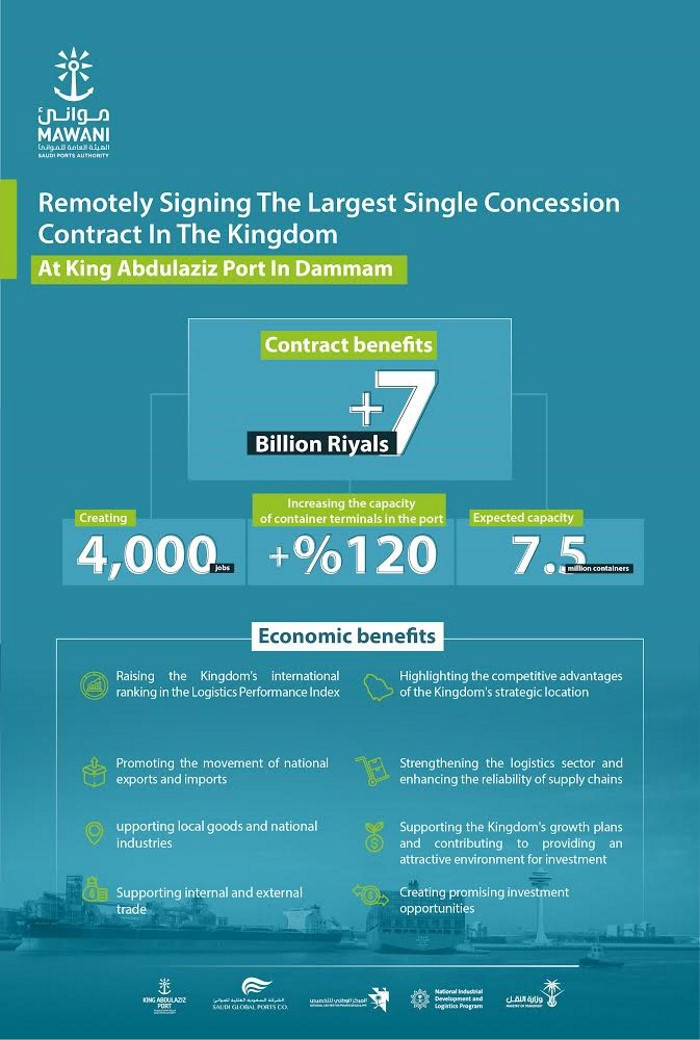The remotely signed agreement will span 30 years and with attract investments of SAR 7bn
Saudi Ports Authority (MAWANI) and Saudi Global Ports (SGP) recently signed a new Build, Operate and Transfer (BOT) agreement for the Container Terminals in the King Abdulaziz Port in Dammam in the Kingdom’s Eastern Arabian Gulf coast over a virtual signing ceremony today.

Under the patronage of HRH Prince Saud Bin Nayef Bin Abdulaziz, the Governor of the Eastern Region, (MAWANI) has signed remotely the largest 30-year BOT Agreement in the Kingdom with SGP with investments exceeding SAR 7bn (US$ 1.861bn) to develop and operate container terminals at King Abdulaziz Port in Dammam.
The remote Agreement Signing ceremony was held with the participation of the minister and several senior officials including HE Eng. Saleh Al-Jasser, Minister of Transport and Chairman of the Saudi Ports Authority; Khaw Boon Wan, Coordinating Minister for Infrastructure and Minister for Transport of Singapore; HE Eng. Saad Bin Alkhalb, President, Saudi Ports Authority; and Eng. Abdullah Al-Zamil, Chairman, Saudi Global Ports (SGP).
Planned goals
The BOT Agreement represents a major step toward achieving the strategic objectives and development plan of the Saudi Ports Authority by conceding some of its services in partnership with the Ministry of Transport and with the support of the National Center for Privatization.
The Agreement activates the MoUs signed in the presence of HRH Prince Mohammed Bin Salman Bin Abdul Aziz Al Saud, Crown Prince, Deputy Prime Minister and Minister of Defense, during the inauguration of the National Industrial Development and Logistics Program (NIDLP).
Upon assuming the responsibility of managing both Container Terminals, SGP will embark on a development and modernization program to transform King Abdulaziz Port into a mega container hub and increase the Port’s capacity to an estimated annual handling capacity of 7.5 million Twenty-foot Equivalent Units (TEUs) when the planned expansion works are fully completed.
The total estimated investment of more than SAR 7bn will provide more than 4,000 job opportunities in the port and logistics sector. It is a part of the continuous developments carried out by MAWANI in the Saudi ports.
Expanded Infrastructure
Under this agreement with SGP, MAWANI is to invest and develop key infrastructure such as berths and container handling equipment, and will more than double the existing container handling capacity of King Abdulaziz Port in Dammam.
The investments will focus on environmentally friendly and technologically sophisticated systems, including the adoption of automation to develop a modern Saudi workforce.
“The continued developments in Saudi ports are consistent with the national efforts to attain the goals and pillars of our country’s ambitious vision to promote sustainable economic development and raise competitiveness,” affirmed HE Eng. Saleh Al-Jasser.
The Minister also indicated the importance of this Agreement to raise the operational and logistical performance level and develop the infrastructure of Saudi ports, contributing to reaching regional leadership and international competition.
Top logistics player
Al-Jasser explained the economic feasibility and expected impact of this new Agreement as it enhances logistics, raises the reliability of supply chains, supports local and international trade and contributes in raising the rank of the Kingdom at the logistics performance index to become among the 25 best countries around the world.
This Agreement also attracts new investments to the national economy, support local content and national industries and increases the national exports and imports that contribute to creating promising investment opportunities.
HE Eng. Saad Alkhalb, President of the Saudi Ports Authority (MAWANI), remarked that the new BOT Agreement at King Abdulaziz Port is a continuation of the Agreements concluded by MAWANI last December to develop container terminals at Jeddah Islamic Port with investments exceeding SAR 9bn (US$ 2,393bn).
He further indicated that the total expected investments in Jeddah Islamic Port and King Abdulaziz Port in Dammam is expected to top SAR 17bn (US$ 4.519bn).
“These new Agreements will contribute mainly to developing berths, increasing the capacity of container terminals in King Abdulaziz Port by more than 120%, and providing integrated solutions to operate container terminals. They achieve technological and information integration and automation of operating systems and set environmentally friendly operating practices, which contribute to strengthening their leading role in the global maritime traffic and supporting the import and export operations,” Alkhalb added.
Singapore cooperation
HE Khaw Boon Wan, Singapore’s Coordinating Minister for Infrastructure and Minister for Transport, valued this partnership as it strengthens the relations and cooperation between the Kingdom of Saudi Arabia and the Republic of Singapore.
He also indicated that the Saudi ports are witnessing a qualitative shift in their systems and procedures by launching more advanced services in its ports along the western and eastern coasts.
“I appreciate this successful and ambitious partnership with the Saudi Ports Authority, which reflects our commitment to achieving aspirations of our wise leadership in the Ports and Maritime Transport Sector. Our company relies on innovation in its products by applying the best international standards in the field of port operation with the assistance of qualified national cadres,” commented Eng. Abdullah Al-Zamil on the occasion.
It is worth noting that King Abdulaziz Port is the largest Saudi port on the Arabian Gulf coast. It is an integrated trade gateway linking the Kingdom with the world. It has 43 berths. It has an area of 19sqkm. It has a capacity of 105 million tons.
Inland links
The sea port is linked to the Riyadh Dry Port by railway which helps goods from all over the world enter the Eastern and Central Regions of the Kingdom.
The port provides comprehensive operational services. It has modern handling equipment that enables the port to handle various types of cargo.
It includes two advanced container terminals, one refrigerated cargo terminal, two general cargo terminals, two cement plants: one for exporting black cement and clinker and one for white cement, bulk grain terminal, Iron ore handling terminal, naval vessel manufacture area and gas and oil platform.
The port contains a ship repair facility that includes two floating ship docks to accommodate ships up to 215m long.

